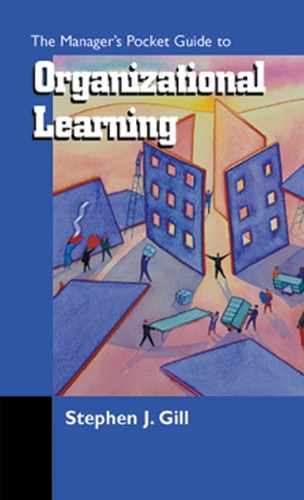Reflection and feedback are the core competencies of organizational learning. Reflection is looking at ourselves honestly, without excuses, and analyzing the strengths and weaknesses of what we say and do. Reflection also offers us the opportunity to learn from experience: You cannot learn from experience unless you consciously take the time and make the effort to stand back and look at your behavior in the organization, as if holding up a mirror and saying to yourself, What do I like in the image? What do I want to change? Individuals, groups, and organizations as a whole can hold up the mirror and ask these questions of themselves.
Feedback, in the organizational learning sense of this term, is the ability to analyze a situation and tell others how what they have said or done has affected us, and then be open to their reactions. Feedback helps people learn from their own behavior; it adds to what each person might be learning from reflection. Feedback mechanisms can be built into the organization so that individuals, groups, and the organization as a whole are continuously receiving information that they can use for improvement.
The chart that follows provides some helpful guidelines for using feedback.
GUIDELINES FOR USING FEEDBACK
1. Look at feedback as a gift—be open and receptive to it, and even encourage it. Ask for feedback from all your customers, your employees, your direct reports and peers, and anyone else who can help you learn and grow as a person, as a professional, and as a leader of your organization.
2. Work on developing self-mastery—the interpersonal style needed to genuinely encourage others to provide feedback, and the mental attitude needed to stay receptive, even when feedback is negative. Don’t be defensive, and always thank the feedback-giver. Remember: You’re the one who decides, after some reflection, whether the feedback merits action, and if so, what action.
3. Make sure that feedback in your organization is received and applied in the context of the entire system. Limiting feedback to select levels is like limiting team-performance results to select team members: It makes no sense at all, especially if changes are needed. And don’t forget, customer feedback is the real gift you need to actively seek out, over and over again.
4. Bring to your organization all that you personally learn about feedback, receptivity, flexibility, and adaptability. The more senior your level in the organization, the more important this is.
(Adapted from The Manager’s Pocket Guide to Systems Thinking and Learning, by Stephen G. Haines. Amherst: HRD Press, 1998, p. 47.)
